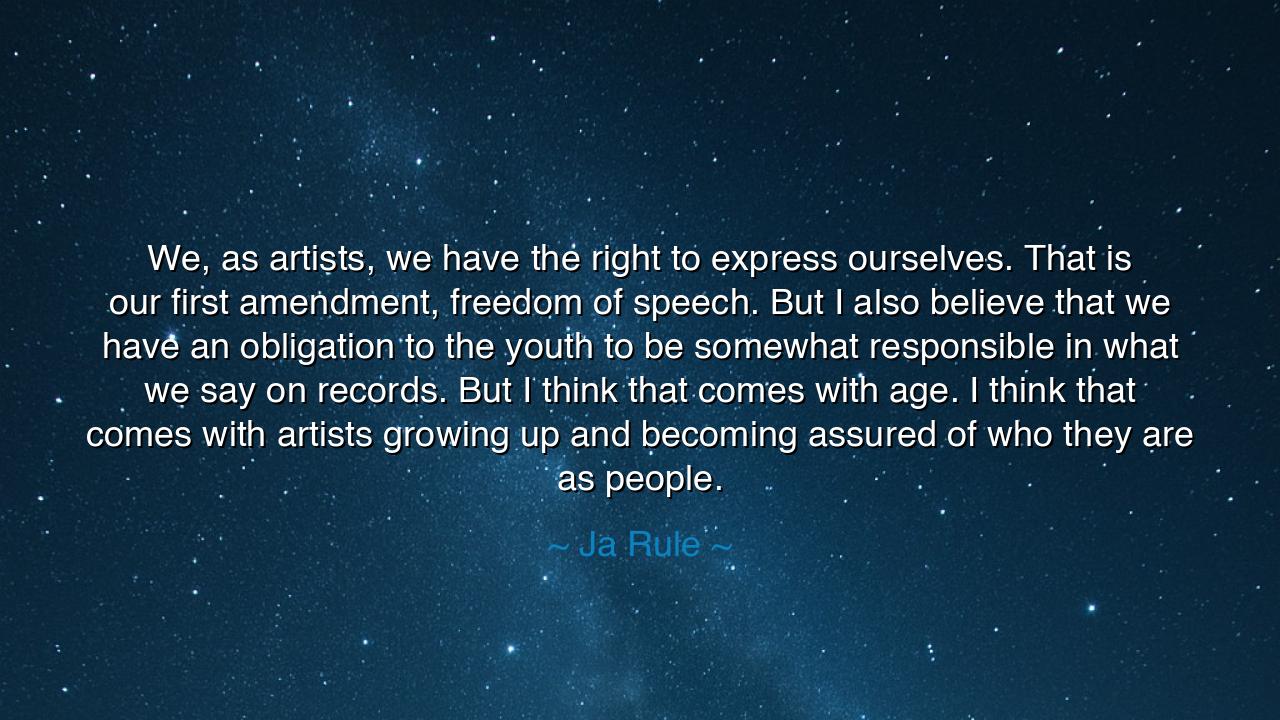
We, as artists, we have the right to express ourselves. That is
We, as artists, we have the right to express ourselves. That is our first amendment, freedom of speech. But I also believe that we have an obligation to the youth to be somewhat responsible in what we say on records. But I think that comes with age. I think that comes with artists growing up and becoming assured of who they are as people.






“We, as artists, we have the right to express ourselves. That is our First Amendment, freedom of speech. But I also believe that we have an obligation to the youth to be somewhat responsible in what we say on records. But I think that comes with age. I think that comes with artists growing up and becoming assured of who they are as people.” — Ja Rule
Thus spoke Ja Rule, the poet of rhythm and flame, whose voice once echoed through the pulse of an age. In these words, he wrestles with a paradox as old as civilization itself — the balance between freedom and responsibility. He speaks not only as a musician but as a human being awakened to the weight of influence. For to create is divine, but to guide is sacred. The artist, he reminds us, is not a creature apart from the world, but a force within it — shaping hearts, shaping thought, shaping the very spirit of a generation.
At the heart of his reflection lies the First Amendment, that precious shield of liberty which grants every soul the right to express the fire within. This freedom — born from centuries of struggle, inked by those who valued voice over silence — is the lifeblood of art. Yet Ja Rule, like the wise of old, knows that freedom without wisdom becomes noise, and power without conscience turns to poison. Expression, therefore, is not merely a right; it is a responsibility — a call to speak truth, not merely to shout one’s feelings.
Consider the story of Plato and the poets of Athens. The philosopher loved the art of words, yet he feared their unbridled force. He warned that the poet, if careless, could shape the souls of the young toward folly as easily as toward virtue. And yet, even Plato could not silence art’s necessity — for the heart of a people is carried in its songs. So too does Ja Rule, a modern heir to those ancient debates, speak with both reverence and caution: yes, let the artist speak freely, but let him also speak wisely, for his words may become the mirror in which the youth see themselves.
There is a sacred moment in every artist’s life — the crossing from passion to purpose, from creation for fame to creation for truth. In youth, the artist often sings for the thrill of hearing his own voice; but with age comes vision, and with vision comes assurance — the calm knowledge of who one is and what one’s words awaken in others. Ja Rule calls this the artist’s maturation: the moment when expression ceases to be an act of rebellion and becomes an act of guidance.
Look to the life of Bob Dylan, who once sang of storms and revolutions with fire and fury. As he aged, his voice deepened not just in tone, but in wisdom. His later songs were not calls to arms but calls to understanding. He, too, learned that the true artist must both stir and steady the hearts of his listeners. Freedom of speech remained his torch, but compassion became his compass. Such transformation — from raw voice to wise messenger — is the evolution Ja Rule describes, the journey from artist to elder.
For the power of the artist is vast. His words travel further than his body ever can, entering the minds of the young like seeds upon the wind. If those seeds are bitter, they will grow bitterness; if they are noble, they will grow strength. Thus, the artist’s duty is not to censor his soul, but to purify it — to make sure that what he releases into the world carries truth, not poison; light, not corruption. This awareness, Ja Rule says, “comes with age,” for only through the trials of living can one learn the sacred weight of words.
Practical counsel for all creators and seekers of truth:
-
Guard your freedom fiercely, but use it with reverence; every word you speak shapes more than your own soul.
-
Seek self-knowledge, for only those who know who they are can speak with integrity.
-
Remember the youth, for they are the listeners whose hearts are still clay, soft and impressionable.
-
And let your art not only move, but uplift; not only challenge, but heal.
Thus the teaching of Ja Rule stands as a bridge between liberty and virtue: that the artist must sing, yes — but sing with understanding; must speak, yes — but speak as one aware of the power in his voice. For expression is a flame, and every flame both warms and burns. The wise artist learns to tend it, to use it not for destruction but for illumination. And in that sacred mastery of self, the artist becomes not only free — but truly great.






AAdministratorAdministrator
Welcome, honored guests. Please leave a comment, we will respond soon